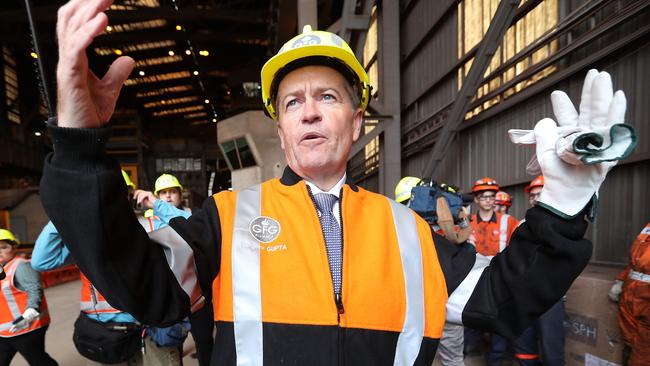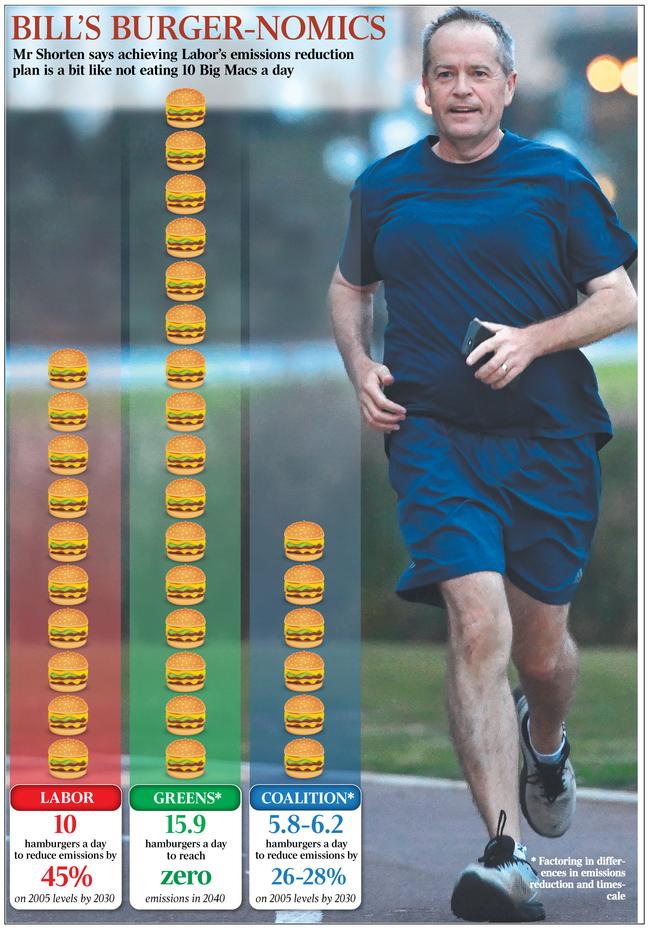Cost of Shorten’s Big Mac whopper to leave us all with a sour taste


How this explains Labor’s decision to seek to reduce emissions by 45 per cent by 2030 is anyone’s guess. Do only fat people bear the costs? And what do the Big Macs stand for — coal-fired power plants?
We have more evidence of the large economy-wide costs of Labor’s 45 per cent proposed emissions cut from the updated modelling conducted by Brian Fisher, former head of the Bureau of Agricultural and Resource Economics.
It should be noted that Fisher is attempting to be as kind as possible by assuming the rest of the world is carrying its weight in meeting its Paris Climate Agreement commitments. He also assumes that there will be enough gas in Australia that can be accessed at $10 per gigajoule. This is important to what happens to electricity prices.
According to Fisher, the use of international carbon credits makes a big difference to the overall cost because the cost of domestic abatement rises with the size of the emissions cut. It becomes rational at a certain stage for the emissions cut to be effected through the purchase of international credits rather than taking domestic action.

What we don’t know is the extent to which Labor will allow its carbon abatement budget of 1.3 billion tonnes by 2030 to be met from international credits. If one half of this amount — 650 million tonnes — can be achieved through the purchase of international credits, then the overall cumulative cost to the economy is much reduced — from $1.2 trillion to $542 billion.
On the other hand, limiting the purchase to 25 per cent of the abatement budget leads to substantially higher economy-wide costs compared with the 50 per cent scenario. To put some relatable figures on the table, Fisher estimates the baseline average growth of GDP through the 2020s as 2.9 per cent a year. With the Coalition’s policy, the figure becomes 2.8 per cent. With Labor’s policy and 50 per cent international credits, the figure is 2.6 per cent; with 25 per cent international credits, it’s 2.1 per cent. This shows the importance of knowing Labor’s intentions in respect of the purchase of international credits.
You might think that a difference of 0.2 percentage points or even 0.7 percentage points between the Coalition and Labor looks like relatively small beer. This is not the case as these differences compound over the years, with the result being large differences in real wages and household incomes.
With 25 per cent international credit purchases, there would be 322,000 fewer jobs and average real wages would be lower by 11 per cent or $11,600 in 2030, according to the modelling. If Labor is going to rely so heavily on the international carbon credit market — and note that the financiers in London have cornered this market by bringing buyers and sellers together while clipping the tickets as well as developing a derivative market — we should be told what proportion of the abatement task will be left to this market.
We should also be told the answers to some key questions. What is the likely price of international credits in the future? The most likely figure is $55 per tonne. From where will the credits be mainly sourced? The answer is China, because it is not bound to reduce its emissions by 2030.
Can we have confidence in the integrity of these credits? The answer hinges mainly on the trustworthiness of the validation process. These carbon markets seem to have been successful for the less prevalent greenhouse gases, but are not proven for CO2.
It’s not clear that the politics of allowing large-scale purchases of international credits will work well for Labor. It’s easy to foresee considerable pushback, including from the Senate. But in the meantime, Shorten is happy to talk about fat people cutting back their consumption of Big Macs. It might make sense to him but everyone else is baffled.


The Prime Minister jokes that he knows more about Labor’s climate change policy and its cost than Labor. He could well be right given Bill Shorten’s recent wonky analogy: Labor’s policy is like fat people eating fewer Big Macs.